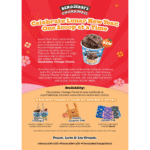Pause the madness. First things first, keep in mind that there is a big difference between more traffic (people who visit your page) and more qualified traffic – (people who engage with your page). During a crisis, if you want more traffic, you can buy followers or do any viral posts to follow the market trend or force all your family members to Like and Share your page. But, if you want qualified traffic, you have to start making content as a king in every posting.
Let’s say that people look up to professionals in general; more than ever during a personal crisis or world crisis. With that in mind, you should be alert and sensitive to the types of content that you provide to your social media audience so that they could easily find you.
Creating content that addresses pain points. Since you’re the expert to solve your clients’ issues and discuss the industry common concerns, offer actionable steps to resolve the issues. Illustrate it with practical stories that could reach more people than those who ping your inbox. Remember to only share when you’re confident with your industry expertise. This is to avoid false information and mislead others. Compile all common FAQs and share the news updates for your community. You can also share good works done by others, and relevant service and operational information of your firm during this crisis time.
Get personal. Don’t just rely on automation. Automatic words, automatic posting type and time. Get personal with each post. Sit down and make a list of the people that are important to you to stay top of your mind with. Instead of blasting everything on your social media or sending a mass email every two to three days, call or email them in your capacity. A relationship is built on trust and this crisis time is a good time to walk the talk.
Keeping things fresh. “Freshness” is one of the many factors that Google uses to determine the quality of content and how high in the search engine results pages (SERPs) a site should rank. What makes content fresh? You can start with a series on certain relevant topics during crisis time. One topic could lead to another topic with input from followers with common concerns. For example, an employment law firm publishes a series of blog posts on employee’s rights during a crisis every day for a week, and blog posts on employer’s rights during a crisis the following week.
Don’t be too greedy with your content. Pause any non-essential press releases, announcements or a great piece of content that is not of concern at the moment. Pause or cancel all your automated marketing to suit the changes during the crisis and be sensitive to your community.

















